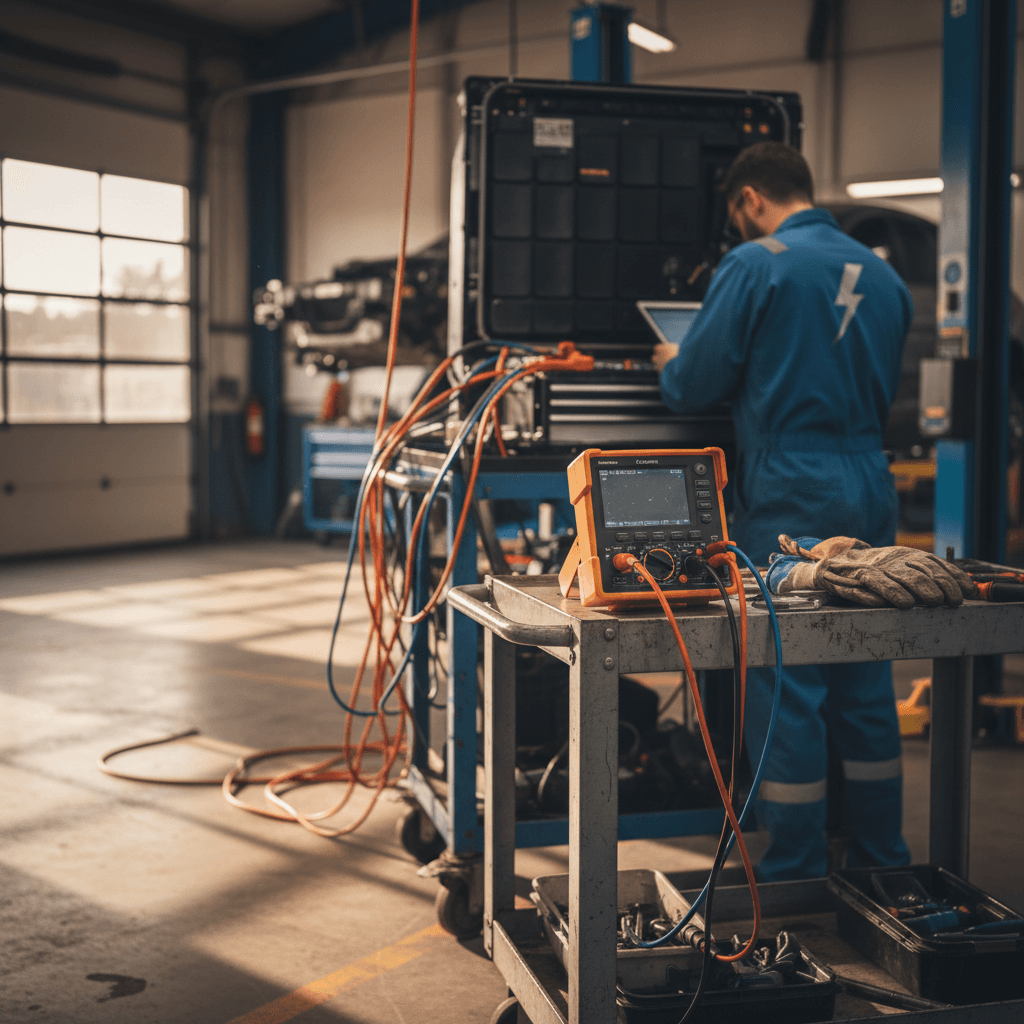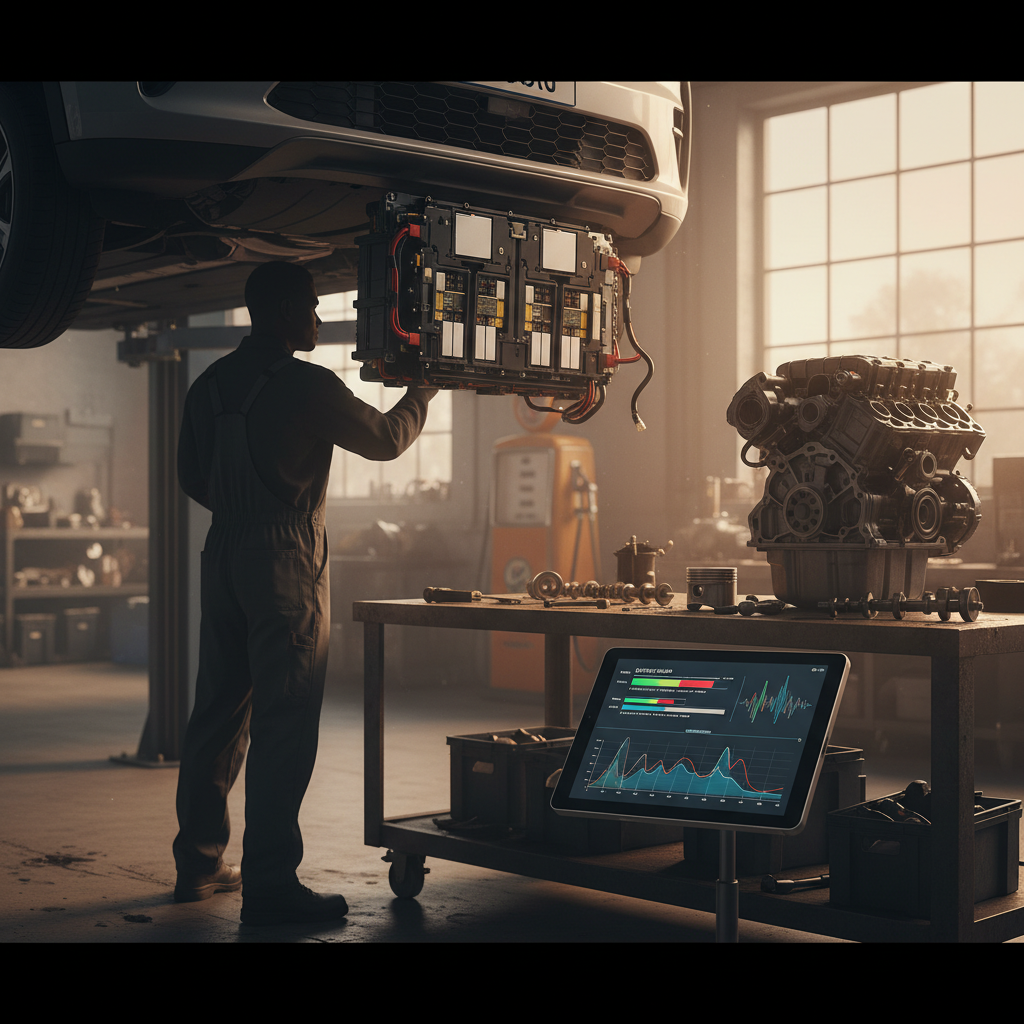When you type “vehicle repair shops near me” into your phone, you’re usually not having a great day. Maybe there’s a warning light on the dash, a mystery noise, or you just realized your EV’s due for service. Choosing the right shop matters even more with electric vehicles, where the wrong hands can turn a small problem into an expensive headache.
EV repair is catching up fast
Why “vehicle repair shops near me” matters more with EVs
With a gas car, you can usually roll into almost any neighborhood shop and get competent help. With an EV, it’s different. High‑voltage batteries, sophisticated software, and brand‑specific diagnostics mean not every shop that pops up under “vehicle repair shops near me” is actually ready for your car.
What today’s repair landscape looks like for EVs
That doesn’t mean EVs are fragile, if anything, they need less routine service than gas cars. It simply means you should be more intentional about which vehicle repair shops near you you trust, especially once your factory warranty runs out.
Types of vehicle repair shops near you (and who they’re best for)
Common repair shop options you’ll see nearby
Each type of shop plays a different role in your EV’s life
Franchise dealerships
Best for: Warranty work, recalls, brand‑specific software updates.
- Factory tools and technical service bulletins.
- Technicians trained on your exact make.
- Often the only option for complex high‑voltage or software issues on newer EVs.
Independent repair shops
Best for: Out‑of‑warranty maintenance and many mechanical repairs.
- Usually lower labor rates than dealers.
- Great for tires, brakes, suspensions, and general checks.
- EV‑capable shops can handle more, especially on older models.
Specialist EV shops
Best for: Battery diagnostics, high‑voltage issues, and brand‑specific EV quirks.
- Techs focused on hybrids and EVs all day.
- May offer battery reconditioning or module‑level repairs.
- Less common, but growing in larger metro areas.
Start with a “tiered” strategy
How to actually find EV‑friendly repair shops near you
Search results for “vehicle repair shops near me” tell you who’s close, not who’s qualified. To find EV‑friendly options, layer a bit of detective work on top of that first search.
4 ways to narrow down local repair shop options
Stack a few of these and the best shops start to stand out
1. Use certified locator tools
- Check the National Institute for Automotive Service Excellence (ASE) shop locator for ASE‑certified facilities.
- Use AAA’s Approved Auto Repair search if you’re a member.
- For EVs, look for mentions of hybrid/EV expertise or specific EV certifications on their profile.
2. Read reviews with context
- Google, Yelp, and local forums are useful, but filter reviews by vehicle type when you can.
- Pay special attention to reviews from EV owners and long‑time customers.
- Look for patterns: honest estimates, good communication, cars fixed right the first time.
3. Ask other owners
- Check local Facebook groups, EV clubs, or neighborhood forums.
- Ask what people drive, how long they’ve used the shop, and what work was done.
- EV owners are often eager to share which local shops really get these cars.
4. Give a shop a “test drive”
- Start with something simple: tire rotation, cabin filter, alignment, or brake check.
- Use this to gauge how the shop communicates, explains issues, and treats your car.
- It’s much better to learn about a shop on a small job than during a big repair.

Certifications that separate great shops from the rest
You don’t have to become a technician, but knowing a few key logos and acronyms will help you sort the real pros from the maybes when you’re comparing vehicle repair shops near you.
What to look for on the wall (or website)
ASE certification and the Blue Seal
The ASE (National Institute for Automotive Service Excellence) logo is the baseline for modern automotive training. Shops with ASE’s Blue Seal of Excellence employ a high percentage of ASE‑certified techs and commit to ongoing education, exactly what you want on complex EVs.
EV‑specific training or credentials
Ask if technicians have completed EV or hybrid training: ASE’s EV safety and hybrid/EV specialist tests, dedicated EV courses, or factory training from brands like Tesla, Ford, Hyundai, or GM. For high‑voltage or battery work, this is non‑negotiable.
Manufacturer or dealer certifications
For brand‑new EVs, dealer certification still matters. A shop that’s recognized by your vehicle’s manufacturer will have the latest software, service bulletins, and access to proprietary tools.
Evidence of safety practices
High‑voltage gloves, lock‑out/tag‑out procedures, insulated tools, these are signs a shop takes EV safety seriously. If you see casual behavior around high‑voltage components, that’s your cue to leave.
Don’t assume “we work on all vehicles” includes EVs
Reviews, red flags, and what to look for on a shop visit
Online reviews are helpful, but walking into a shop, even for five minutes, tells you how your car and your time will be treated. When you’re checking out vehicle repair shops near you, use both.
Green flags: signs you’ve found a good shop
- Clean, reasonably organized bays and waiting area.
- Service advisors who listen more than they talk at first.
- Technicians willing to explain findings in plain language.
- Written estimates with parts, labor, fees, and taxes broken out.
- Photos or digital vehicle inspections to show what they found.
- Clear policies on warranties, storage fees, and turnaround time.
Red flags: when to keep searching
- Pressure to authorize repairs immediately “or else.”
- Vague explanations like “it’s all bad” instead of specifics.
- No written estimate or refusal to prioritize repairs.
- Reluctance to answer questions about EV experience or training.
- Stacks of unresolved cars sitting for weeks with no clear reason.
- Angry, consistent complaints in reviews about honesty or misdiagnosis.
Key questions to ask any repair shop (especially for EVs)
A five‑minute phone call can often narrow your list of vehicle repair shops near you down to one or two solid contenders. You’re not interrogating them, you’re making sure your car ends up in the right hands.
- “Do you regularly work on my make and model, and specifically the EV version?”
- “Which of your technicians are ASE‑certified, and do any hold EV or hybrid certifications?”
- “Can you share an example of EV work you’ve done recently?”
- “Do you offer digital inspections or photos so I can see what you’re recommending?”
- “What kind of warranty do you offer on parts and labor?”
- “How do you handle software updates or recalls, do those still need to be done at the dealer?”
- “If you find more than one issue, will you help me prioritize what’s urgent versus what can wait?”
It’s okay to shop around
Dealer vs. independent shop for EV repairs
There’s no single right answer here. The best approach is knowing when each option shines. Think of your local vehicle repair shops as a toolbox: the dealer is the specialty tool, the independent shop is the one you’ll use constantly.
Dealership vs. independent shop: which should you choose?
Use this as a quick reference the next time you’re staring at a check‑engine light, or an EV warning message.
| Scenario | Dealer service center | Independent/EV specialist |
|---|---|---|
| Warranty repair or recall | Usually required; covered work, access to official parts and procedures. | May not be authorized to perform warranty repairs; can advise you to visit the dealer. |
| Software update or connectivity issue | Best choice; direct access to factory tools and servers. | Limited access; some can update via OEM portals, others will refer you to the dealer. |
| Out-of-warranty brake, tire, or suspension work | Often higher labor rates and OEM‑only parts. | Typically 20–30% lower labor rates; can use OEM or quality aftermarket parts. |
| High-voltage battery fault | Many OEMs require dealer diagnostics; may replace entire pack. | Experienced EV specialists may offer advanced diagnostics or module‑level repairs where allowed. |
| Routine inspections and wear items | Capable but may upsell dealer service packages. | Great for honest prioritization and building a long‑term relationship. |
In many cases, the smartest move is to start with the dealer for warranty or complex software issues, then lean on a trusted independent shop for everything else.
Ask about labor rates up front
Estimates, warranties, and avoiding surprise costs
The right vehicle repair shop near you isn’t always the cheapest on paper, it’s the one that gives you accurate estimates, stands behind the work, and helps you budget realistically over the life of the car.
Cost and warranty checkpoints
Insist on a written, itemized estimate
Every estimate should break down parts, labor hours, shop supplies, and taxes. If the numbers don’t make sense, ask the service advisor to walk through it line by line.
Ask about diagnosis vs. repair costs
Many shops charge a separate diagnostic fee, especially for complex EV issues. Clarify whether that fee is applied to the repair if you approve the work.
Compare warranties, not just prices
A shop that offers 12‑month/12,000‑mile (or better) warranties on parts and labor is signaling confidence in their work. Some top independents offer 24‑ or 36‑month warranties on common repairs.
Get clarity on parts options
For out‑of‑warranty work, ask about OEM vs. aftermarket parts and why they recommend one over the other. On critical EV components, OEM is often worth the extra cost.
Be wary of vague “bundled” EV repairs
Planning ahead: repair strategy if you’re buying a used EV
If you’re shopping for a used EV, finding the right vehicle repair shops near you isn’t an afterthought, it’s part of the buying decision. You want to know who will be in your corner five years from now, not just who’s selling you the car today.
Before you buy a used EV
- Identify at least one nearby dealership that’s certified to service your EV’s brand.
- Find an independent shop or EV specialist that’s comfortable with your make and model.
- Ask whether they perform pre‑purchase inspections on EVs (including battery health checks where possible).
- Budget for a baseline inspection shortly after purchase to catch any deferred maintenance.
How Recharged helps simplify this
- Every EV on Recharged comes with a Recharged Score Report, including verified battery health and fair market pricing.
- Our EV specialists can help you understand likely maintenance and repair costs over the next few years.
- If you’re trading in or consigning your EV, we help present its condition clearly so the next owner knows what they’re getting.
- Because the process is fully digital, with optional delivery and an Experience Center in Richmond, VA, you can focus on finding the right car, not worrying about hidden repair surprises.
FAQ: Vehicle repair shops near me
Frequently asked questions about vehicle repair shops near you
The next time you punch “vehicle repair shops near me” into your phone, remember that you’re not just looking for whoever’s closest. You’re choosing a long‑term partner for one of the most complex machines you own, especially if it runs on electrons instead of gasoline. By focusing on certifications, EV experience, clear communication, and solid warranties, you can turn a stressful breakdown or warning light into a straightforward repair. And if you’re still in the shopping phase, pairing a trusted local shop with a transparent used EV marketplace like Recharged is one of the smartest ways to keep your budget, and your battery, on track.

